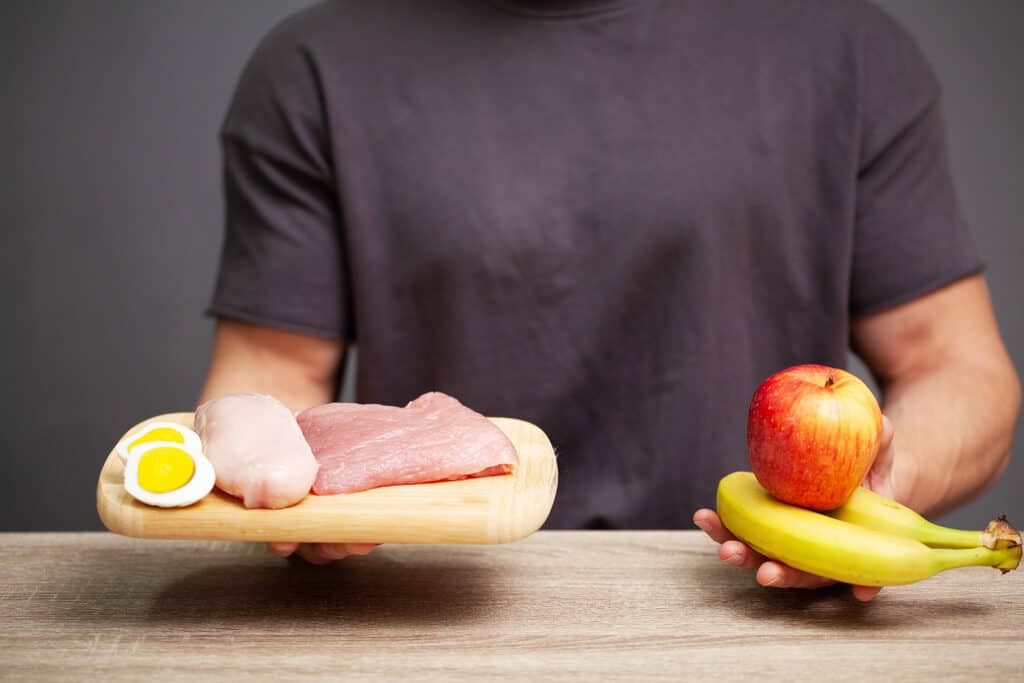A qualified nutritionist will always recommend eating real, whole food as a first option in order to meet daily protein needs. This can be very challenging to do consistently over time though. It can also be difficult if someone requires a large amount of protein each day in order to build lean muscle mass. This is where protein drinks enter the picture.
When is the best time to consume protein drinks, before or after a workout? How many grams of protein should a typical protein drink contain? On the flip side, you have hundreds of different supplement companies to choose from and their job is to push product through creative marketing campaigns. So which way do you turn? Hopefully this article will help shed some light on the subject.
The website Examine.com has been up and running since 2011 and is a trusted source when it comes to nutrition and supplement information, and a good place to start!
Protein Intake Prior to Exercise
There is minimal scientific literature that has looked at the benefits of protein supplementation before or after exercise.
One research study divided 21 men into two groups, with both groups getting a protein drink containing 25 grams of protein. One of the groups received it right before their workout, while the second group received it following their workout. All of the subjects performed full-body strength workouts three times a week for 10-weeks. The results of the study found no significant differences in muscle strength or size between both of the groups. The results of this particular study suggest that as long as you consume protein around your workout, it really doesn’t matter if it’s before or after a workout.

Protein Intake Post Exercise
Previous studies have shown that 20–25 grams of protein is adequate to stimulate increases in muscle protein synthesis (MPS) after weight training. The present study challenged this conclusion, testing the idea that those with greater lean mass require more protein to stimulate maximal MPS after training.
Examine.com
In one research study, researchers recruited 30 healthy males who were strength training twice a week for six months prior to the study. Subjects were grouped together based on how much lean muscle mass they each had. The study consisted of two separate trials separated by two weeks, where subjects ingested either 20 grams or 40 grams of a protein drink. The protein drink contained whey protein mixed with water and taken immediately post exercise. The study resulted in a significant change (20 percent) in muscle protein synthesis in the group that took 40 grams of protein after exercise. This occurred when researches did not account for differences in lean body mass in any of the test subjects.
LBM did not factor into the protein requirement for maximal MPS. This study showed that 40 grams of protein induced greater MPS than 20 grams in both high and low LBM groups, contradicting previous studies suggesting that MPS after exercise is maximized after ingesting 20–25 grams of high-quality protein.
Examine.com
Additional Study Insight
One reason this study showed promising results was because of the amount of protein used. The subjects who were given higher doses of protein (40 grams) experienced better results. The design of the study called for 40 grams of protein in place of the more traditional 25-30 grams that is widely recommended. The positive results most likely had something to do with the amino acid leucine. Most protein drinks either don’t contain leucine or have only trace amounts of it. Leucine is an extremely important ingredient and a key building block needed for stimulating muscle protein synthesis.
If you’re looking to increase your protein intake through supplementation, do it gradually. The reason for this is there can be side effects of taking too much protein. Most of the side effects of whey protein are related to digestion issues. Individuals who have difficulty digesting whey protein may experience symptoms such as bloating, stomach cramps, gas, and diarrhea. Many of the side effects are attributable to lactose intolerance. Lactose is a form of sugar found in milk and whey protein. People who are lactose intolerant don’t produce enough of the enzyme lactase, which the body uses to help breakdown lactose.
Final Thoughts on Protein Recommendation
The amount of protein that someone needs to build muscle mass depends on many variables. A reasonable goal is to obtain the majority of calories from protein by way of whole foods. Look to supplement daily intake with reputable whey protein drinks containing 3-5 percent leucine would be prudent. Finally, it really doesn’t matter when you drink protein drinks, before or after exercise. Taking in slightly more protein than the recommended amount of 25-30 sounds like a good choice. Finally, drink plenty of water throughout the day as well. Eat Well & Stay Strong!
Reference
The Response of Muscle Protein Synthesis Following Whole-Body Resistance Exercise Is Greater Following 40 G Than 20 G of Ingested Whey Protein. Physiol Rep. 2016 Aug; 4(15):e12893. doi: 10.14814/phy2.12893.
Stay Strong Together
Jefit, named best strength training app by Sports Illustrated, Esquire, GQ, Men’s Health, Greatest, Forbes Health, and many others. We offer a community responsible for 92,000,000 workouts to date! The app, which recently passed 10 million downloads, comes equipped with a customizable workout planner and training log. Our technology also has ability to track data, offer audio coaching cues, and can share workouts with friends. Visit our members-only Facebook group. Connect with like-minded people, share tips, and advice to help get closer to reaching your fitness goals.
Read the scientific paper published in the Journal of Medical Internet Research using the Jefit app. Also, a great Jefit app review was recently published by MUO that can be found here.
- Whey vs. Casein: What’s the Best Protein for Building Muscle - April 18, 2025
- Four Popular Jefit Chest Exercises Backed by Science - April 16, 2025
- 4 Must-Have Exercises Backed by Science for a Full-Body Workout - April 14, 2025
